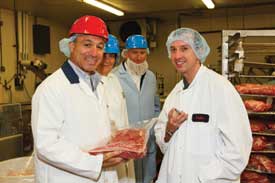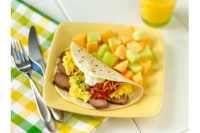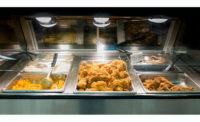
Deli Brands of America has a mastery of traditional deli meats and newer value-added products.
Baltimore’s “Corned Beef Row” on Lombard Street, home to delis, processors and marketplaces in the 1920s and ‘30s, is down to just three surviving delis. But the city’s ties to its former deli meat history are still strong, thanks to Deli Brands of America.
Deli Brands is a former Lombard Street mainstay now being led by the third generation of the Saval family, it grew from a home-based corned beef manufacturer to the area’s largest independent broad line foodservice distributor and processor. In 2003, the production side of the company became Deli Brands of America.
“The thrust behind the split was to gain some independence from our distribution facility and be able to grow both divisions at the same time,” says Jeffrey Saval, president. His brother, Paul, is the president of the company’s foodservice division. “We felt we had the quality and the ability to service and attract customers large and small. Once we did that, we started going out and getting our own national accounts.”
In the five years since becoming a separate division, Deli Brands has greatly expanded both its product offering and its market presence. The backbone of the company is its roast beef, corned beef and pastrami, available in dozens of varieties and price points, but the company has also taken on value-added products and a steak-cutting operation in recent years. The company’s market area stretches from the East Coast to Colorado, and its co-packing operations has grown to the point that it now accounts for about half of the company’s overall business, with the Saval brand products making up the other half.
“The four markets that we really try to attack are foodservice, retail, chain restaurants, and we also look at being an industrial supplier,” Saval says. In the latter category, he gives an example of a customer that purchases the company’s beef tips and gravy as an ingredient for its pot pies.
The company’s tag line is “Deli with a difference,” and it helps to tell the company’s story, explains Eva Jenson, director of marketing. “Our primary business is further-processed deli meat, but I see the difference in the different value-added products we bring to the table, and also the care and attention to detail that Jeff brings to the table,” she says. “That translates through the whole organization, and that makes a big difference when you’re an end-user or a company that’s looking for someone to partner with. Once they do business with us, long term relationships are developed.”
Deli options
With over 76 years of experience in the deli meats category, Deli Brands can meet practically any need including doing a private label for a retailer. “We realize the branded manufacturers of the world won’t do private label and we can do both successfully,” Saval explains. “We feel that this is a segment that’s growing every day. There are companies requiring private label and this is a niche that we can capitalize on.Deli Brands’ moved into a 30,000-square-foot facility in 1999.It operates 24 hours a day from Sunday afternoon through Friday afternoon. The meat is sized and trimmed according to customer specifications. Everything at the plant produced is produced on a just-in-time basis, orders are processed and shipped out within five days of being completed in order to maximize the shelf life.
Deli Brands has a number of roast beef products to offer retailers, from the highest, choice-grade beef to the more economical soy protein products. Then there is the option of having it injected and tumbled, marinated or hand rubbed, and the cooking option of netting and dry roasting or bag cooking.
“My favorite roast beef is the one that we minimally process and hand rub,” Saval says. “That gives it just enough flavor while maintaining great texture and mouth feel.” Deli Brands corned beef is not tumbled; rather, it is injected and held in curing tanks for 3 to 5 days before cooking. This allows for proper aging and slow curing to assure a superior end product. Pastrami is cured in a similar fashion, rubbed with a special spice blend and cooked in a smoke house for optimal flavor.
Deli Brands spent over $500,000 in the first quarter of this year to purchase a netting machine, two vacuum packaging machines and a skin pack vacuum machine.
“We believe in reinvesting in the company. Prior to this investment, a substantial amount of due diligence is performed to analyze the ROI.” Saval says. “If the analysis proves to give us better quality, better efficiencies and throughput, it’s a no-brainer.” The netting machine alone, which replaced a manual netting operation, is expected to save approximately $50,000 in packaging materials alone, he notes.
The company’s expertise in producing top-quality deli products has carried over to its value-added items as well. It produces such custom formulations as meat loaf for a 500-store restaurant chain located along the East Coast, as well as taco meat for a 39-store Mexican restaurant chain. Its other value added products include corned beef hash and pot roast to name a few.
Deli Brands has taken on several initiatives to spread the word about the company and its capabilities. It exhibited at the National Restaurant Association show this year for the first time in order to develop more relationships with chain restaurants.
“We produce great product, we have a rich heritage, superior quality and service capabilities, and we want to make sure people will know that when they have private label opportunities. We are a great match- big enough to get the job done and small enough to give hands on attention to detail. ,” Jenson says. “We wanted to make sure we were getting our name out there.” The company has also strengthened its sales and marketing force. Jenson, a 9-year veteran with the business, came to the processing division and helped to revitalize the company’s Website, www.delibrandsofamerica.com. Saval says that the company tries to get prospective customers to explore the site and get a better idea of the company’s full capabilities.
Saval also hired several people to bolster the company’s sales force. Christopher Carando joined the company this year as vice president of sales and marketing, which has opened up new markets. Carando is working to establish a nationwide broker network and is targeting foodservice distributors, club stores and industrial accounts.

From left, Jeff Saval, president of Deli Brands of America, Eva Jensen, director of marketing, Ron Tew, vice president of operations, and Sam Gazdziak, IP editor.
Breaking into steaks
Deli Brands’ biggest entry into a new market came in 2005, when it purchased the assets of Auth Brothers, a steak processing business in Washington, D.C. The company had a good reputation and a history that dated even further back than Deli Brands’, having been in operation for 125 years. The company was provided an interesting opportunity for Deli Brands.“We felt that if we took the manufacturing and put it in this facility and took their distribution to our distribution facility, we could grow it and get into the white-tablecloth segment, where we hadn’t been yet,” Saval explains.
Bringing a new processing operation into Deli Brands’ facility caused several headaches and many late nights. Ron Tew, vice president, operations, adds that there were some logistical hurdles to overcome. “Overnight, it added about 500 SKUS. They all had to be set up in our system so that there was a cost and a price associated with [each item],” he recalls. There was also the potential roadblock of somehow creating work orders that contained the individual steak specifications for each customer. “We thought we were asking for the impossible, but our software company really came through with a solution.
The sale was completed on a Friday, equipment was moved from Washington to Baltimore, the company’s computer programs were updated, and electricians rewired the steak-cutting portions of the Deli Brands plant, all in time for work to begin on Sunday afternoon.
Saval admits that he does not have a steak-cutting background, but many of the key Auth employees joined Deli Brands. The Saval Foods distribution business has also taken over the job of distributing the product.
“It’s a much more intricate and demanding yield-intense business, but we are trying to expand it,” Saval says. Within the last six months, Deli Brands has put more effort into improving and tracking yields, and the investment is paying off as the business is becoming more successful.
Saval expects production to continue to increase. Since the company moved into the facility at the end of 1999, it has almost tripled its volume and now produces 170,000 pounds per week. With some key equipment additions and a second packaging shift, Saval estimates it can increase its capacity to 250,000 pounds before either expanding the current building or opening an additional facility.
A positive work environment
Streamlining the work process has been a concerted effort for the company. Wireless PC tablets have replaced clipboards and stray sheets of papers. Information on each lot can be added into a spreadsheet on the production floor or in the oven room and be updated throughout the company’s computer system.“I can tell in the office what’s cooking and what’s chilling,” explains Tew. Additionally, he says that each product has built-in parameters, so employees handling the cooking of the products can always tell when a product is being cooked for too long or at too high of a temperature and make corrections before the entire lot is lost.
“Ron’s done a great job over the last few years developing our in-plant technology and getting the programs in place that make it much easier for us to track and monitor processes.” Saval says.
Turnover is an unfortunate fact of life in the meat industry, but Deli Brands has benefited from a core group of employees who have been with the company for five years of more; the longest-tenured employee recently celebrated his 45th anniversary with the company.
“People that work here like to stay here,” Saval says. “We have people who leave and always want to come back, which are a testament that the grass isn’t always greener and this is a good place to work. There’s a lot of work to be done, but the environment is relatively relaxed.”
Deli Brands of America is a $25 million company, but when combined with its distribution branch, sales top the $100 million mark. That puts the company in the unique position to be small enough to foster that non-bureaucratic environment yet large enough to have a human resources department and other benefits of a large company. t. Saval, having grown up in the company, has done practically every job in the plant, from working the pump machines to sales, so he has done everything that he asks of his employees.
Deli Brands’ 65 employees also represent a diversity of backgrounds, which Saval attributes to the positive workplace environment. Along with a mix of Caucasian, Latino and African-American workers, the company went from having no female employees when it moved into its current facility to females now comprising 15% of the workforce.
As evidenced by the recent capital investment in new equipment, the company is not hesitant to put back into the company, either. Saval notes that the improved technology has made many jobs easier.
“Our employees see that investment isn’t just something we talk about, it’s something we do,” he says. “Even in these tough times, we feel there are ways we can improve our efficiencies and be a little better than we were yesterday- remain profitable and at the forefront of technology.” IP



Report Abusive Comment